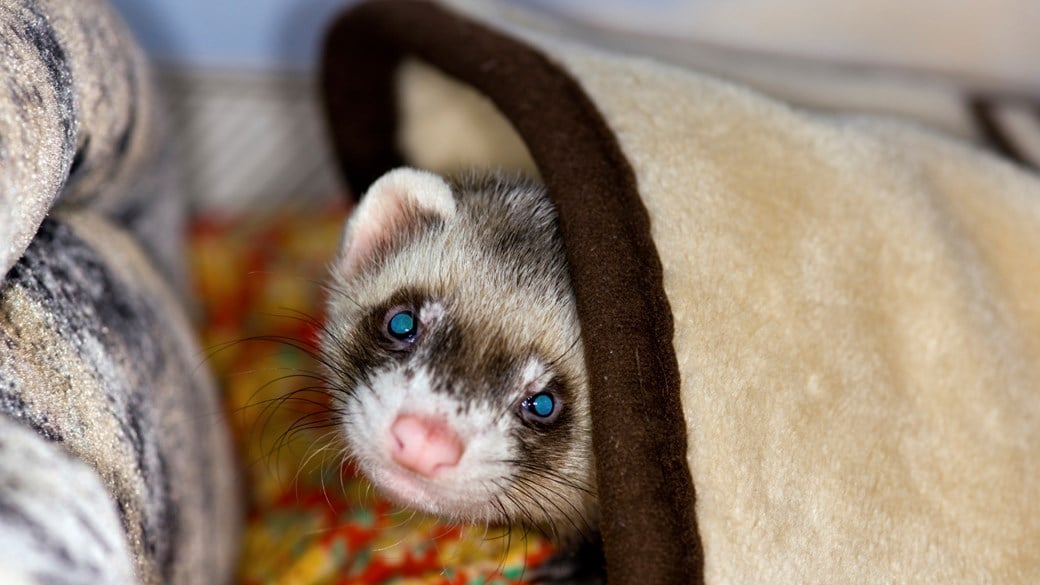
Neutering And Contraception For Ferrets
Ferrets are a very unusual species in the way that they breed.
Sadly, for female ferrets, a lack of male attention (or an injection to simulate the same) during their cycle can even be fatal! Looking after the reproductive health of your ferrets is a key part of ferret ownership.
To discuss what is best for your ferret, contact your local practice.
More about neutering and contraception for your ferret
The breeding period for ferrets is between March and September. As the days get longer, female ferrets (jills) will start to come into heat (oestrus).
Unfortunately, this long breeding season can cause serious problems for jills who do not have access to a male, as only mating or the end of the breeding period can end a jill’s heat. Coming into heat produces a rush of oestrogen, which reduces their body’s ability to make red blood cells. If the heat is not ended in time, this can lead to anaemia, which can be life-threatening.
Once a heat is ended, another heat cycle can start if they are still within the breeding period. Coming into heat can occur multiple times within the same breeding period if ferrets do not fall pregnant.
There are several different ways to stop a jill from coming into season, and therefore preventing the development of anaemia and risk of death.
- Spaying. The removal of the female reproductive tract. This will prevent cycling long term, and will also reduce the smell of the jill.
- Mating her with an intact (uncastrated) male. This will stop the heat, but will very likely also result in a litter and is not recommended unless you are planning on breeding your ferrets.
- Mating her with a vasectomised male. This will stop the heat, but will not reduce her smell. This will need to happen several times throughout the breeding season, every time she comes into heat again. This can also lead her to believe she is pregnant and have a false pregnancy, which can cause aggression, nesting behaviour and even milk production.
- Giving her hormone injections. This is often referred to as a jill jab and will suppress heat. Given just before or right at the start of the breeding season, the jill jab often prevents heat for the full period, although some jills may need more than one injection per breeding season.
- Give her a hormone implant (off-licence) which will stop her cycling for 18 months. This will also reduce her smell, although this reduction can take some time to develop.
There are three options for preventing male ferrets from reproducing:
- Castration - the removal of the testicles. This can help reduce the smell of male ferrets, possibly reduce aggression, and also removes the drive to mate.
- Vasectomy - removing a section of the sperm duct to prevent them from being able to impregnate the female. Unlike in humans, a vasectomy in ferrets cannot be reversed. This does not remove any testosterone, so males will still mate with females, only unsuccessfully, and will still smell.
- Giving him a hormone implant. This lasts 16 months, and means he will be unable to impregnate any females in this time. This will also reduce the smell of your male ferret.
Surgical neutering in ferrets can be done in any ferret over 3 months old. In jills it is most often done just before their first breeding season.
Unlike in cats, dogs and rabbits, surgical neutering of ferrets may make them more likely to develop a condition known as ‘hyperadrenocorticism’ (adrenal gland disease). This is a hormonal condition and can lead to hair loss, weight loss, vulval swelling (jills), itchy skin and hyper-sexuality (even in neutered animals). There is no cure for hyperadrenocorticism, but the condition can be managed, and in some cases changes are only cosmetic.
Surgical neutering does have some pros. Surgical neutering removes the risk of any cancers of the reproductive organs (ovarian, uterine and testicular), and also removes the risk of uterine infection in jills. There is only a single cost, as this is the only permanent option.
Although there are some pros to surgical neutering of ferrets, it is rarely recommended due to the wide availability of the implant, and the risk of developing hyperadrenocorticism.
Hormone implants are the most often recommended alternative to surgical neutering of ferrets, and are the best option for most ferrets. They are given as a slow release implant, and prevent males being able to impregnate females. This product can also be used off-licence in female ferrets to prevent cycling. The implant will also reduce the smell from both male and female ferrets, although this benefit can take over three months to develop.
The hormone implant will last male ferrets 16 months, and starts to work within a few weeks. In females, the implant lasts 18 months, so will take her through two breeding seasons. A short false season may occur shortly after implantation.
